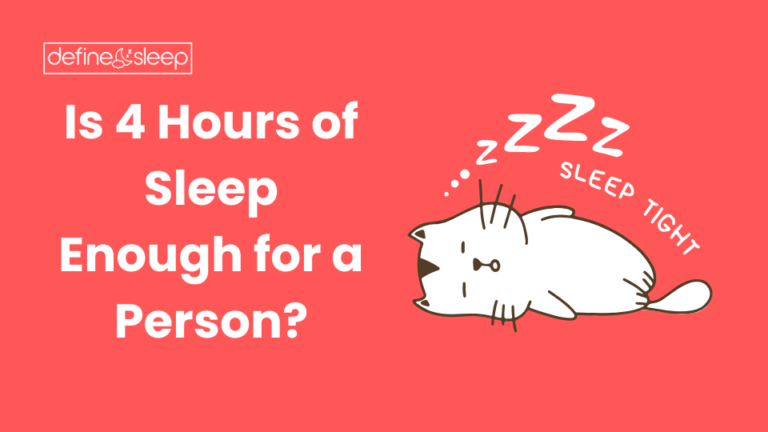Introduction
Sleep is a fundamental aspect of our well-being, and how we position ourselves during those precious hours of rest can significantly impact the quality of our sleep. Many wonder, “Are there optimal sleep positions for a truly restful night?” This article’ll delve into sleep psychology and biology to unravel the mysteries behind the quest for a good night’s sleep.
1.1: The Foundation of Quality Sleep

Before we dive into the specifics of sleep positions, let’s explore the foundation of quality sleep. According to sleep experts, adults typically need between 7 to 9 hours of sleep per night for optimal health and functioning. The duration alone, however, is not the only factor influencing the quality of our sleep; our sleep positions also play a crucial role.
1.2 The Common Interpretations: Psychology and Biology
Lack of Emotional Control and Sleep Positions
One intriguing aspect of sleep psychology is the connection between emotional control and sleep positions. Research suggests that certain sleep positions may contribute to a lack of dynamic control, impacting our overall emotional well-being.
1. The Link Between Sleep Positions and Emotional Regulation
Experts propose that specific sleep positions, such as sleeping in a fetal position or with tightly clenched fists, may be associated with subconscious emotional stress. These positions, resembling a protective stance, could indicate an underlying psychological need for comfort and security during sleep.
2. Addressing Emotional Stress Through Mindful Sleep Practices
To enhance emotional control during sleep, consider incorporating mindfulness practices before bedtime. Engaging in relaxation techniques, such as deep breathing exercises or meditation, can help create a more peaceful mental state, potentially influencing how you position yourself during sleep.
1.3: The Optimal Sleep Positions

Now that we’ve explored the psychological aspect let’s turn our attention to the biology of sleep positions. While individual preferences may vary, certain parts are considered more conducive to a restful night.
1. Back Sleeping
Sleeping on your back is often recommended by sleep experts. This position aligns the spine, reducing the risk of back and neck pain. It also minimizes facial wrinkles and helps prevent acid reflux. However, using a supportive pillow is crucial to maintain proper spinal alignment.
2. Side Sleeping
Side sleeping is another popular and generally recommended sleep position. This position can benefit those who snore or suffer from mild sleep apnea. To optimize this position, use a contoured pillow to support the neck’s natural curve and maintain spinal alignment.
3. Stomach Sleeping
While stomach sleeping is less commonly recommended, it may work well for some individuals. This position can alleviate snoring but may lead to neck and back pain. To minimize potential issues, use a thin pillow to reduce strain on the neck.
1.4: Creating Your Optimal Sleep Environment

Beyond sleep positions, the overall sleep environment is pivotal in ensuring a restful night. Consider the following tips to enhance your sleep space:
1. Invest in a Comfortable Mattress and Pillows
The right mattress and pillows are essential for supporting your chosen sleep position. Invest in quality bedding that aligns with your comfort preferences and provides adequate support for your body.
2. Maintain a Consistent Sleep Schedule
Engage in calming activities before bedtime to signal your body that it’s time to wind down. This could include reading a book, taking a warm bath, or practicing relaxation exercises.
3. Create a Relaxing Bedtime Routine
Establishing a consistent sleep schedule helps regulate your body’s internal clock. Aim to go to bed and wake up simultaneously each day, even on weekends, to promote a healthy sleep-wake cycle.
Conclusion

Understanding the interplay between sleep positions, psychology, and biology is key in the quest for a truly restful night. While optimal sleep positions may vary from person to person, fostering emotional control and creating a supportive sleep environment is universally beneficial. Experiment with different sleep positions and mindful practices to discover what works best for you, paving the way for rejuvenating and restorative sleep. Sweet dreams await those who prioritize their sleep health!
FAQ

1Q. Why do sleep positions matter for a restful night?
Sleep positions influence the spine’s alignment and can impact factors such as snoring, acid reflux, and facial wrinkles, ultimately affecting the overall quality of sleep.
2Q. Is there a connection between sleep positions and emotional control?
Research suggests that certain sleep positions resembling protective stances may be linked to subconscious emotional stress. Mindful sleep practices, such as relaxation techniques, can address emotional stress during sleep.
3Q. What is the recommended sleep duration for adults, and how does it relate to sleep positions?
Adults generally need 7 to 9 hours of sleep per night for optimal health. While sleep duration is crucial, the chosen sleep position can also impact the quality of rest, influencing factors like back and neck pain, snoring, and sleep apnea.
4Q. Which sleep position is considered the most optimal for a restful night?
Back sleeping is often recommended by sleep experts for its alignment benefits. Side sleeping is also popular and can be beneficial for snoring and mild sleep apnea. However, individual preferences play a significant role, and the right sleep position varies from person to person.
5Q. How can I create an optimal sleep environment beyond choosing the right sleep position?
Besides sleep positions, the overall sleep environment is crucial. Investing in a comfortable mattress and pillows, maintaining a consistent sleep schedule, and establishing a relaxing bedtime routine are essential steps to enhance the sleep space for a restful night.
Help From Chatgpt 4





Your writing style is captivating! I was hooked from the first paragraph. The way you weave facts with narrative is truly skillful. This post not only informed me but also entertained. Can’t wait to see what you write next!
Thank You